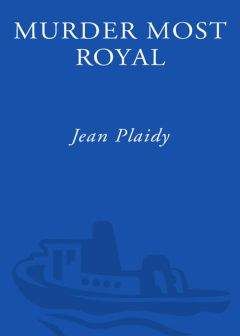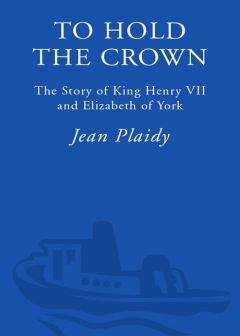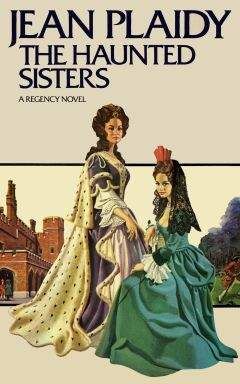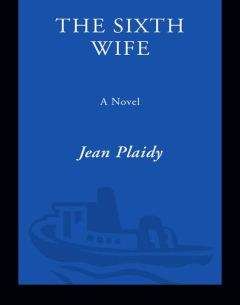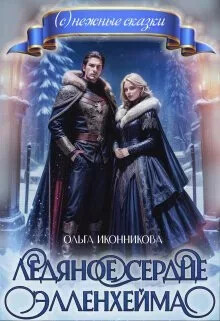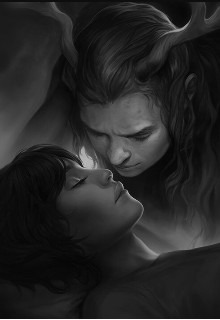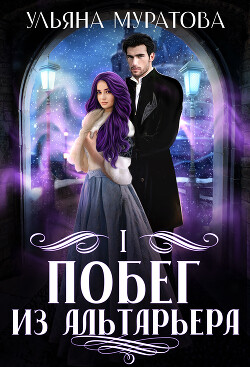Jean Plaidy - For a Queens Love: The Stories of the Royal Wives of Philip II
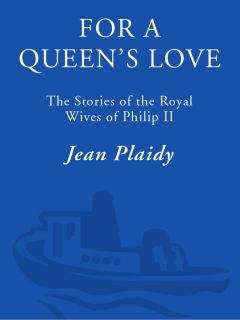
Помощь проекту
For a Queens Love: The Stories of the Royal Wives of Philip II читать книгу онлайн
Along the route the people had gathered. Philip was aware once more of thousands of eyes upon him. He felt smaller than he did in the privacy of his own apartments; he longed to be grown up, and as tall and strong as Ruy.
But Ruy was riding close to him. That gave him courage. He did not turn his head to look at his friend, but he was aware of him. He recalled his encouraging words: “Do not be afraid. There will be just several hundred pairs of eyes instead of one.”
The procession, this time led by the Queen, had reached the gates of the Cloister. There it halted, and one of the nuns, who had been waiting at the gate, said in a loud voice, which could be heard by the stragglers on the edge of the crowd: “Who would enter in?”
Leonor answered for the Queen. “It is Doña Isabella, Queen and Empress, with her offspring, Philip and Maria.”
The nun immediately made a deep obeisance and signed for the gates to be flung wide open.
How cold it was inside the Cloister! Philip dreaded the moment when he would be stripped of his clothes. If he felt cold he must not give the slightest sign. When he was stripped he must not shiver, for if he did, all would see, and what would they think of the one who was destined to rule them if they looked on a poor, shivering baby?
The Abbess had come forward to greet the Queen, and when the Prince was presented to her, she knelt before him so that her cold gray eyes beneath her hood were level with his.
They went along to the great hall where food was laid out for them, and the Queen sat at the head of the table with Philip on her right hand. Maria, who sat next to Leonor, did not realize the solemnity of the occasion.
“Philip!” she called. “Look at me!”
But he did not look at her. He gave no sign that he had heard her. How could he, heir to half the world, allow himself even to notice the frivolity of a careless child who, it seemed, would never understand Spanish dignity and Spanish solemnity. Leonor was smiling indulgently. They would all be saying: “Ah, but she is a Hapsburg. What can one expect?” Yet why should he not also be a Hapsburg? He had the same father and mother as Maria. But a prince who would one day be a king of Spain must be Spanish in every way. His father was a Hapsburg, but the people of Spain wanted a Spaniard to rule over them. Philip had no choice. He had to be a quiet, solemn little Spaniard. Philip of Spain must be what others wished him to be.
But in any case he would have been quiet on this day because he was frightened. This was his first big public ceremony, and it was devised for him. If there had been no Philip, there would have been no gathering of solemn people. He must not fail to play his part in the manner that was expected.
The meal was over and they left the table. His mother had taken him by the hand and was leading him through the cold corridors. He had become intensely aware of the cold; that was because he knew that soon they would take his clothes from him. He would shiver. He knew he would shiver; he would shiver with cold and fright. They would despise him and … his father would hear of it.
They had entered the chapel—surely the coldest in the world. Now he must stand on a dais. His mother had left him and he stood alone. The nuns came forward. He did not like their black, flowing garments; their cold, pale faces seemed to leer at him from their hideous cowls; they were like creatures from a nightmare.
His teeth began to chatter. He prayed to the Holy Virgin, to the saints, and to the Cid: “Help me to be like the Cid … like my father.”
The nuns laid their cold hands upon him; deftly they stripped him of his clothes; they took everything from him, even his shift. There he stood, with all those eyes upon him, a naked little boy, with the whitest of bodies, which in itself was somehow shameful among these brown-skinned people.
He knew that somewhere among the watching crowd was Leonor; and the impulse came to him to look for her, to run to her and to cry against her breast, begging her to take him away from all these people and give him back his clothes.
He lowered his pale eyes and looked at his toes. None would guess how hard he was fighting to hold back his tears, to prevent the frail body from showing, by its shivering, how frightened he was.
The moments of nakedness could not last forever, although it seemed to the little boy that they would never end. But at last the cold hands were laid upon him and clothes were being slipped over his head. He was turned this way and that. The tight hose were put on his legs and he was forced into the breeches—the kind worn by men. Now came the black velvet jacket and the feather-decorated biretta. He watched the nuns’ white fingers fix the jewel-encrusted dagger in his belt. He was tired with so much standing and he found it difficult to stand straight and still as he had been told he must.
And now that he was dressed the ceremony was not over. The noblemen and monks had come to the dais, and one of them began to enumerate his titles in a very loud voice. Philip had not known that there were so many. He tried to remember them, for he expected it was very wrong not to know them all. He discovered that not only was he heir to half the old world, but also to the new one. So many possessions and the tight new clothes were almost more than he could bear.
Then his eyes caught the face of his new friend, Ruy Gomez. Ruy smiled at him. Philip did not return the smile. He gave his friend a solemn stare, but he was happier suddenly.
He listened to the protestations of loyalty; he accepted the homage; he looked with indifference, as he had been taught to do, from the swathed figures of the Dominican monks to the helmeted soldiers of the guard. He might be Don Philip the Prince of Spain; but he was also the friend of Ruy Gomez da Silva; he was still Leonor’s little Philip.
Philip never forgot the day his father returned. That was the end of childhood.
He had changed considerably from that frightened little boy of four who had stood naked before the grandees and ladies of the court, the monks, the nuns, and the soldiers in the Cloister of St. Anne.
He was less delicate, though still small for his age; his hair was yellow now, but his eyes were still the same pale shade of blue. He was quiet, dignified, and if he was not brilliant, he was intelligent; the most unusual of his characteristics was his astonishing self-control.
Friendship with Ruy Gomez had continued. Philip liked to have the boy in attendance, and if at times he wondered whether Ruy’s affection for him was tempered by the knowledge that he would one day be the King, and a king’s friendship could be a profitable one, Philip did not hold that against him.
Each day the importance of his position was impressed on Philip anew. When his father’s letters arrived, they were read to him. Charles wished his son to follow the course of his campaigns in Europe; and Philip, always docile, always obedient had listened when he was expected to listen, and absorbed as much as he could. He could speak no other language than Castilian; he had not distinguished himself in any branch of learning; but he could discuss his father’s campaigns as intelligently as though he had taken part in them.
And it was at this stage that Charles found an opportunity to break away from his military life and visit his family.
Philip stood in the great hall waiting to receive his father. He was clad in black velvet according to the fashion, but he wore a blue feather in his biretta—chosen by Leonor because she said it made his eyes look more blue.
Philip was aware of the anxiety all about him. He knew that his mother wished he were a few inches taller, and that the blue feather was meant to add that extra blue to his eyes so that they did not seem weak. All those about him were apprehensive as to the effect of the Prince on his father, the Emperor.
Then came the sound of heralds, the clatter of horses’ hooves and the cries of welcome; and into the hall stepped the hero, the legend, Charles the Fifth of Germany, Charles the First of Spain.
Their eyes met—father’s and son’s.
Charles saw a little boy—a very little boy—and his heart leaped with compassion and tenderness. He whispered to himself: “So that’s my Philip. Holy Mother of God, give him a good life.”
Philip had looked at the god and taken in as much as he could before making his obeisance. He saw a heavy man who seemed large more on account of his girth than his height. There was yellow hair, not unlike Philip’s, a yellow beard, a broad forehead, and a large, aquiline nose. His eyes were bluer than Philip’s; his face was crisscrossed with many lines etched, not only by anxieties, but by wind and sun of Germany, Italy, and Flanders as well as Spain. His aspect would have been benign but for the heavy, jutting jaw, which implied that ruthlessness and cruelty would not be lacking if the occasion demanded it.
To Philip he seemed to fit the picture of his imagination. There was power in the man and it emanated from him.
Charles had eyes for no one but the boy.
“My son!” he cried. “My son Philip!”
Then he strode forward and, as the boy would have remained kneeling, he cried: “Come, let me look at you. So you are my son, eh? You are Philip?”
Then he laughed loudly—for he was after all a Hapsburg, and if he wished he would defy Spanish ceremony—and embraced the boy, and held him fast against him as though he would never let him go.
At length he released him, and the Queen came forward with Maria. Maria, who was six, was old enough for decorum, but she showed none. She threw her arms about her father’s neck and refused to let go when commanded by her mother. Over her fair curly head the Emperor’s eyes met the solemn ones of his son and he smiled with approval, for he saw in this boy one who would be loved by the people of this alien land.
Throughout the town there was feasting and revelry at that time. Philip heard the continuous shouting of the people in the streets; and later he must stand on a balcony beside his father while the people cried out their loyalty; and when they declared that they could not see the Prince, his father lifted him on to his shoulders while the people cheered more wildly.
There was a great banquet, and while his father laughed and talked with the great ladies and gentlemen of the court, Philip was aware that he was the one whom his father constantly watched. Philip was quiet; he spoke only when spoken to.
When his attendants had put him to bed, his father came into the apartment. He stood by the bed looking down on his son.
“Tomorrow,” he said, “we will talk. We have much to say to each other.”
Philip immediately rose, for he knew it was wrong that he should lie down while his father stood, but Charles gently pushed him back on to the bed, saying: “No ceremony. We are alone. There are times when we may be just father and son. They have made a Spanish Don of you, I see.”
“It was not what you wished, Sire?”
Charles stooped and pressed the boy’s shoulder, noting how thin it was. “I am well pleased,” he said. “Sleep now. Tomorrow we shall have much to say to each other, you and I.”
Charles was delighted with his son’s knowledge of his campaigns in the dominions. He saw at once that although Philip might not be a brilliant scholar his sharp intelligence would doubtless stand him in better stead.
Already Charles was growing tired of his military career. He told Philip so. “There are many times when I long for my home and my family. Grow up quickly, my son, for my armies need a younger man to command them. Affairs of state too can be settled the better by fresh minds.”
When he took the boy on his knee Philip was at first shocked by such familiarity, but when they were alone Charles laughed at his solemnity.
“It is not always necessary to stand on ceremony, my son. Throw off the restraint when we are alone. Be yourself. Laugh. Drink. Enjoy good food. Good food … good wine … those are the real pleasures of life, and there is nothing to compare with them. Others besides great rulers can enjoy them; but that does not mean that great rulers should not also do so. Would I could live at ease with my family. I would like to see many brothers and sisters growing up with you and Maria. But when a man is always abroad how can he get children … legitimate children? It is impossible. And when an Emperor has such a son as you, he feels his first duty is to hold his dominions together. Duty! It is the bane of a ruler’s life. Oh, I sigh sometimes for freedom. Do you know what I would do, little son, if I had the free will to choose? Nay, you cannot guess. Become a monk, I think; give myself to prayer, keeping my soul safe for God, and saving the souls of others—for it is an easy thing for a wandering soldier to commit sins. Ah, you have a great task before you. I see great days ahead for Spain. We have made of it an industrial land. Who would have thought that possible? Think of Spain … the whole of Spain … Andalusia … Aragon … New Castile … Old Castile … all Spain. Think of the barren tablelands, the rocky, impassable sierras, the rushing rivers. Think of that. Or are you too young? You stand there looking so wise. Is it real wisdom, little son, or is it that you know when to hold your tongue? But perhaps that shows the greatest wisdom of all. You have learned to be silent. You will say: ‘But, my father, you have not this gift.’ ” Charles burst into loud laughter. “No, I have it not. And how can I be silent when I meet my son … my Don Felipe, Principe d’Espagne? I have thought often of these meetings. I have thought of what I would say to you. I want your way to be easy. I want you to profit from the mistakes your father has made.”
“You have made no mistakes, Sire.”
That made him laugh more loudly. “So they told you that, did they? Bravo! But you are too wise to listen to such tales. A great task is yours, and you will do it better if you read the thoughts behind men’s words, the meaning behind their smiles. I have had many defeats in my life, many disasters. I have made many mistakes, and you will not profit from them if you look the other way and call them victories. Oh yes, before the people we talk of victory, but alone together we will speak the truth. You understand?”
“I do, your Highness.”
“Then call me Father. I like that word better on your lips. Philip, my son, my little one, grow up quickly. I need your help.”
As Philip gazed into his father’s face an extraordinary revelation came to him. This Emperor who talked of defeat seemed a greater hero than the faultless image which had been put constantly before him. This Emperor’s struggles seemed more noble than the easy victories of that other.
“Yes,” went on the Emperor; “we have made this into an industrial country. People from the valleys of the Elbro and the Douro, from the Tagus and the Guadalquivir leave their unfertile land and come to the towns. In Seville the best silk in the world is being made; from Toledo come the finest blades. Wool and cloth are being sent to our colonies. You see what great good our adventures did for Spain when they brought new lands under our domination, for it is our silks, our wools, our wine, and our grain that are sent to our colonies. We will allow no others to send it. The New World … Mexico and Peru is ours, and for that we must thank our adventurers. A country’s greatness is measured not only by its native soil but by rich new lands that it has gathered to it; its foster-children are as important as its own, not only for the treasure they bring—the gold, the precious jewels, and the slaves—but for the commerce. You understand that?”
